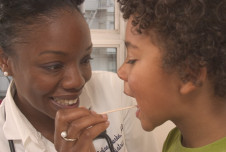We gathered on a vast west-facing hillside, as the October sun sank over Tomales Bay. Just when we thought nature’s awesome show was over, a giant harvest moon began to rise over the eastern horizon. Many oohs, ahhs, and other vocal bursts of delight ensued, along with applause and laughter. It was the second evening of this year’s inaugural Greater Good Institute for Health Professionals, and that shared experience of gratitude, awe, and social connection reflected the spirit of the entire event.

The three-day institute drew health care professionals from around the world and across disciplines, including physicians and nurses, social workers, mental health professionals, and more. They came to enhance their sense of meaning and purpose at work; to build skills of resilience, mindfulness, emotion awareness, and self-compassion; and to strengthen their connection and communication with others. The event included education, self-reflection, group-based activities and skill building, and opportunities to embody what they learned.
This journey took place in a retreat, but attendees aimed to take what they learned back into the day-to-day rollercoaster of their work. Here are some key takeaways from the event about how to cultivate your own well-being as a health professional and to nurture your relationships with coworkers and patients.
1. Connection
In my experience leading trainings in hospital settings, I find that positive, kind, and helpful connection with colleagues is the most under-appreciated source of stress resilience, well-being, and peace. If we are ruminating about a difficult interaction with a colleague or patient, then sharing with a caring, supportive colleague can transform our mood completely. When we intentionally practice kind and supportive interactions with others, we can foster a collaborative work environment where successes and failures can be shared and bared together.
The default form of social connection in many workplaces is happy hour, which can exclude people with responsibilities at home and can turn into a unproductive venting session. To explore other ways to connect, we structured the institute around opportunities to engage in meaningful and playful activities together, from deep conversations to a fun treasure hunt.
Bringing this sense of belonging to your workplace might involve intentionally scheduling a time to check in with colleagues about what is going well, or creating a space for shared photos or inspirations for all. Organizations can also bring coworkers together to learn new resilience skills.
2. Gratitude
On the last afternoon of the institute, we spent time in small groups based on participant interests, including home health and chaplaincy, primary care, medical education, and more. Each group came up with a plan to implement one activity at their work in the next month—and the vast majority of these groups chose gratitude as their first-line activity.
Simple practices of gratitude—at the beginning of a meeting, perhaps, or privately with a colleague—do more than just shift our well-being and outlook. They can also ignite more kind and altruistic behavior: When we receive and acknowledge generosity from others, we are more likely to share that feeling through acts of kindness.
“I sometimes get so caught up in the work that I forget the value of my wellness,” said one participant. “I so enjoyed refocusing on gratitude and compassion with your team and with the other participants. I found myself re-grounded and relaxed.”
Genuine gratitude goes far beyond a simple statement of “thanks.” It includes a clear description of what you are thankful for and how it helped or supported you. If you want to start practicing gratitude with your team, you can sign up together for the Greater Good Science Center’s online gratitude journal, Thnx4, or try out these other gratitude practices.
3. Empathy
There is a longstanding apprehension among health care professionals and medical educators around practicing compassion and empathy. This emerges from the belief that empathic health care providers lose objectivity in their decision making, are susceptible to “caring too much,” and succumb to feelings of shared despair with their patients—leading to depression and burnout.
But research inside and outside of health care has called this idea into question. Researchers like Helen Riess and Jamil Zaki are finding that a measure of empathy can effectively inform clear-headed, compassionate care, which leads to better outcomes for patients and greater well-being and satisfaction for health care providers. There is still the possibility of “empathic distress” when a provider becomes overly identified with a patient, but this is something we can guard against.
At the institute, participants connected in pairs to reflect on specific times at work when they experienced the kind of empathy that leads to emotional distress or cynicism (both related to burnout) versus the kind of empathy that leads to compassionate care. The participants’ awareness and honesty around their struggles with empathy were deeply moving. Some described feelings of cynicism about patients whose demands were untenable; others described feeling overwhelmed in working with illness and death, especially with young patients.
Creating space for caring and sharing like this requires feelings of trust and safety, which don’t necessarily arise naturally in workplaces. Still, if you have a friend or colleague whom you trust, engaging in this type of inquiry and reflection together could help you find ways to continue offering care without depleting yourself.
4. Self-compassion
Self-compassion—applying kindness and care towards our own challenges and struggles—sounds like it would be simple for people in the caring professions. And yet it is easy to ignore our own needs if we see our struggles as insignificant in comparison to the struggles of our patients, or if we don’t feel as though we’ve lived up to our high standards.
Perfectionism is a well-documented issue for some health care professionals. While it can provide us with the drive to complete grueling medical studies and rigorous training, the dark side of perfectionism is a feeling of never being enough. The hierarchical structure and constant evaluation in medical education feeds these self-critical beliefs, which we can easily internalize.
At the institute, participants talked about their harsh inner critic, who is continually comparing their performance to some ideal and evaluating them as falling short. Self-compassion is a practice of giving yourself kind, caring attention—the type you’d give to a friend or loved one. Self-compassion is not only useful in the face of perceived and real failures or errors; it can also be the first line of defense when facing immense suffering and hardship among patients.
With self-compassion, we take a moment of mindfulness to recognize our difficulty and struggle, whatever the reason—whether we feel we created it, or whether we are feeling the pain of another. That simple acknowledgment of our challenge is immensely influential on its own.
The next step is to recognize that we are not alone in our struggle or suffering, that many people suffer just like us. And, lastly, we apply some kindness towards ourselves: a phrase or word that feels soothing, something a dear friend might say to us. These three simple steps, as described by researcher Kristin Neff, can be followed any time throughout the day or at the end of the day, as we reflect on our challenges.
5. Meaning and purpose
A core theme woven throughout the institute was how to reinvigorate a sense of purpose and meaning in health care work. Health care has intrinsic meaning because it involves helping others to be well, but this can be obscured beneath intense schedules and the demands of electronic medical records.
We opened our event by simply asking attendees to reflect on three questions about meaning, which you can try with your colleagues, as well:
- When was the last time you experienced meaning?
- How did you know it was meaningful? What does meaning feel like—in body, mind, and heart?
- Where do you have opportunities to cultivate more of this feeling of meaning in your daily work life?
Participants in the training could easily find recent experiences of meaning, especially when focusing on their interactions with patients. They remembered moments when they did feel appreciated, as well as interactions with colleagues that deepened their sense of connection. Hearing about simple feelings of meaning or gratitude in a colleague can provide support and inspiration when our own sense of efficacy or value is compromised.
As one participant said, “The importance of cultivating meaning in our work was a huge piece for me and has allowed me to renew a sense of purpose, to notice and capitalize on the good things that happen . . . and to develop a stronger sense of presence.”
As part of our application process, we asked participants to share their motivations for attending the institute, including how they planned to share what they would learn and how their work addresses pressing issues of equity and inclusion. The responses were deeply inspiring. This group was dedicated to sharing knowledge with colleagues, trainees, and patients across different cultural and economic backgrounds, and creating programs that meet the needs of specific populations, whether veterans or indigenous people. It’s easy to forget how important and meaningful this work is, in the day-to-day struggle to get it done. At the Greater Good Institute for Health Professionals, we helped each other to remember.
The Greater Good Science Center is now accepting applications for our next Institute for Health Professionals! Apply now to join us on May 1-3, 2020, in Northern California for three days of building resilience, emotional intelligence, and deeper connections with patients, clients, and colleagues.









Comments